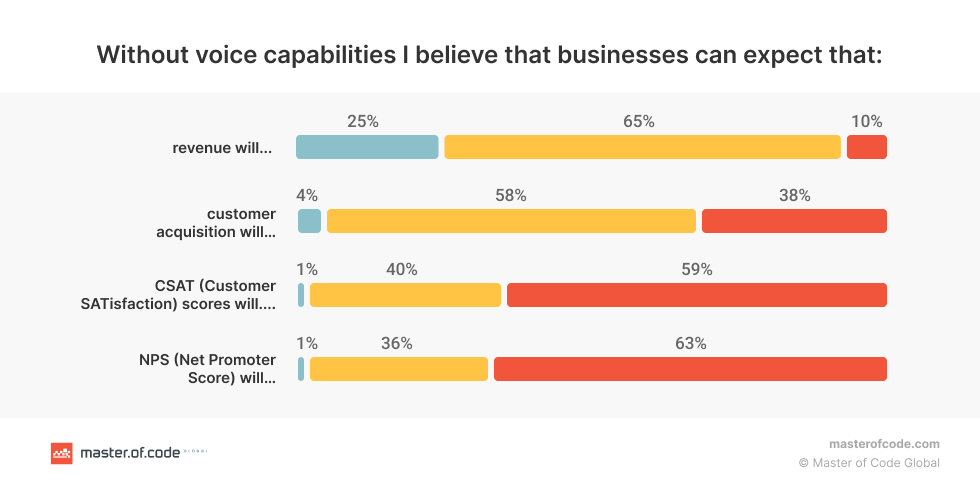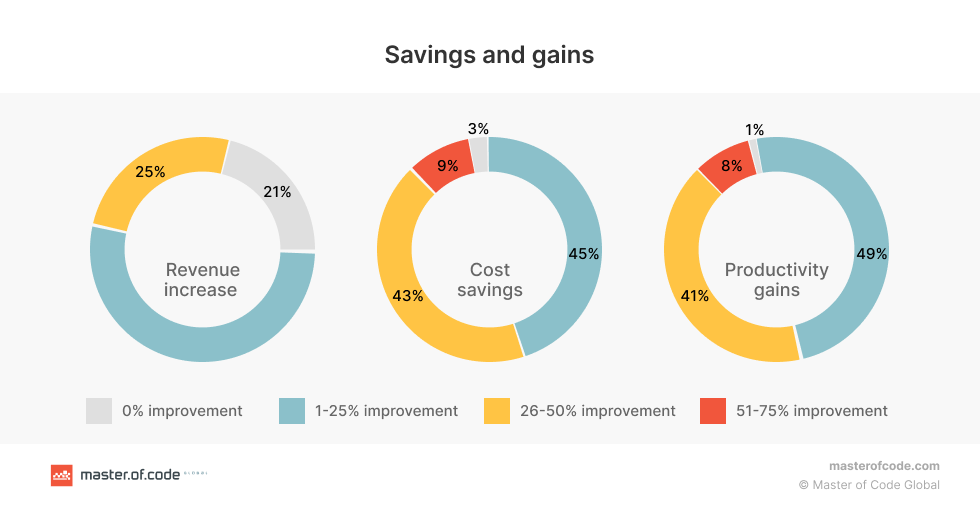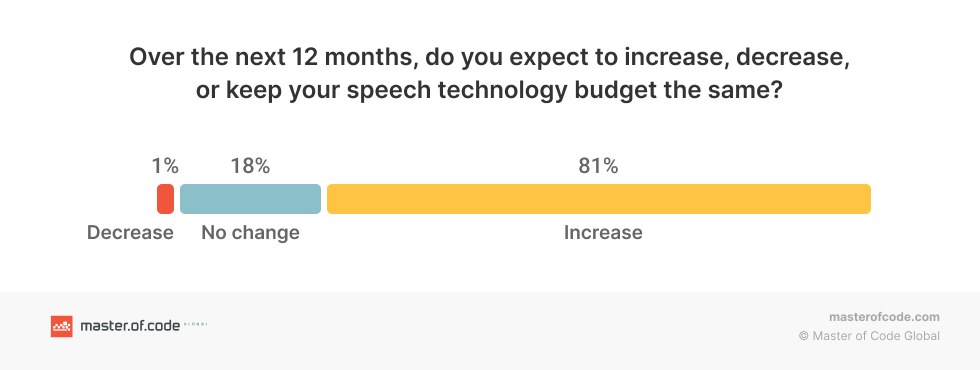A 2019 survey by PWC showed that over 90% of consumers aged between 18-64 years had sought knowledge about voice technology, while over 70% had used it at least once. This massive wave of consumers adopting voice technology for home improvement and ease-of-usage has ushered in a new age for voice assistance. The new consumer trend has also had a positive impact on the business world. The voice assistant market that was worth USD 11 billion in 2019 is now expected to grow by 17% by 2026.

As a result, every year more companies are exploring AI-based voice technologies and finding ways to implement voice assistants both internally and externally for cost savings, automation, business intelligence (BI), and better customer experience.
Another survey by Juniper showed that there were at least 3.25 billion enterprise voice assistants in operation, and the number could reach over 8 billion by 2023. Continuous breakthroughs in AI voice technologies also mean that more businesses find voice assistants increasingly beneficial in business settings. Voice recognition has become an integral part of service delivery as more connected devices enter the market with artificial intelligence and machine learning expanding globally.
Today, enterprise-ready virtual assistants are replacing previous-gen speech recognition systems that failed to imitate the natural human voice experience. This article breaks down the ROI of voice technologies for modern enterprises and offers a quantitative analysis of the overall business value of voice assistant technology.
Learn how voice AI agents can improve customer satisfaction.

Table of Contents
Integration of Voice-Enabled Technologies
One of the leading use-cases of AI-enabled voice bots is digital assistance. These voice assistants are already very popular on different platforms including smartphones and wearable devices, and especially, smart speakers.
Smart speakers are the most widespread voice assistance devices after smartphones in 2020. According to voice assistant statistics, at least 127 million smart speakers were shipped globally in 2020, with China taking the lion’s share. There were over 3 billion AI voice assistants in use in 2019, and the number is expected to grow to over 6 billion by the end of 2023. The voice assistants are mainly used to accept commands or respond to customer queries.

Speech-to-text automated transcription has become an integral part of businesses in the market research and e-learning industry and advanced voice technology recognition made possible by Conversational AI has significantly improved the quality of the transcriptions.
Furthermore, most decision-makers and senior employees have adopted some level of voice-activated technologies personally, but fewer than 31% use them at the business level. It’s not yet clear why a divide exists in perception about deploying virtual assistants, artificial technology in the workplace versus in the home. This forked thinking maybe because over 75% of businesses identify virtual assistant artificial intelligence as a significant initiative but are slow to integrate voice assistant technology into their business models. The fence-sitters often cite the initial investment and the time it takes to train staff for implementing the technology as a constraint. Since most people are already using them at home, training would require shorter periods in case of adoption.
Voice: Challenges amid Opportunity
Ai-enabled virtual assistants have been used for a while now to perform a wide variety of tasks, from answering general questions to finding the right restaurants for a particular occasion. eMarketer recently recorded at least 112 million people using voice assistants in the U.S. monthly, and the figure has risen to over 132 million in 2021.
The increased interest in voice assistant technology means a more significant opportunity for marketers to engage, reach and better understand potential customers. According to Voiceboat.ai, 85 percent more people use smart speakers or over 87.7 million more users, offering marketers a greater chance to reach their target audience.
Virtual assistant artificial intelligence enables marketers to have more personalized conversations, thus allowing the users to share exactly what they are looking for so marketers can give customized answers, thus enhancing personalized experience. Marketers can also make multiple sales since they can access entire households using one voice assistant, sell more, and collect more insights through one campaign.
There remain a few concerns with data security concerns leading the pack with so many benefits of leveraging voice assistants. Some consumers are still wary of what the companies behind the Apps do with their personal data. Voice assistants don’t yet provide as enriching interaction as other channels, which could diminish engagement quality compared to what is available elsewhere. It’s still a bit costly to develop a voice app. In contrast, internal building capacity and developing Voice Engine Optimization (VOE) so you can fully use voice assistants require an investment in time.
Additionally, not all voice assistants are built the same. Some of the voice assistants built today face accuracy limitations brought about by different dialects and accents, timing, word error rate (WER), and difficulty in formatting, and background noise. And while these barriers to fully embracing virtual enterprise assistants do exist, several organizations in the U.S. continue to develop AI voice assistant technologies.
Savings and Benefits of Voice Assistant Adoption
The findings of the Opus Research survey indicate that voice technology is making a significant impact across various sectors, leading many executives to recognize its potential for transforming businesses. In this discussion, they explore the specific areas and scenarios where voice technology can provide value, ranging from improving productivity to enhancing customer experiences .
An effective approach to assessing the value of a technology for an organization is to consider the implications for industry peers if they choose not to adopt it. This is precisely the question that Opus Research addressed in their survey. The majority of respondents (59%) indicated that businesses that neglect to implement voice technology can expect a decline in customer satisfaction scores, leading to a reduced likelihood of customers enthusiastically recommending their products and services. Additionally, 63% of respondents expressed that Net Promoter Scores (NPS) would decrease without the inclusion of voice capabilities.

Apart from assessing the impact, respondents also had the opportunity to share their evaluations of the savings and benefits they have experienced through the adoption of voice technology. Interestingly, this year’s primary observed impact appears to be a shift towards cost savings, in contrast to the previous year where productivity gains took precedence. According to 51% of respondents, leveraging voice technology has resulted in cost savings ranging from 26% to 75%. However, productivity gains remain significant as well, with 49% of respondents reporting an increase in productivity ranging from 26% to 75% directly attributable to the implementation of voice technology.

The survey findings also indicate a continued investment in voice technology. A significant majority of respondents (81%) expressed their intention to either “Increase” or “Increase Significantly” their budgets for speech technology. This underscores the recognized value and essential role of speech technology in both ongoing digital transformation initiatives and day-to-day operations of companies.

How Voice Assistant Impacts Your Business
AI voice assistant technology may still be in its infancy, but there’s enough evidence that it will soon be everywhere. According to Deloitte Global, enterprise virtual assistants are the fastest growing device category at over USD 7 billion and still counting. The benefits of implementing voice assistant technology in your business include:
- Automating Business Operations: Including voice assistant technology in your business can free more time for your workers to do more productive things by automating repetitive tasks. You can program voice assistants to do routine tasks so your employees avoid spending time on dull or monotonous tasks.
For instance, AI voice assistants can analyze extensive amounts of data, and by looking at past usage habits of employees, predict actions and make suggestions. Businesses can also use voice assistants in HR to help in sourcing talent and recruiting using machine learning algorithms such as Oracle to screen qualified candidates during the first stages of the process. - Enhance eCommerce Marketing: Businesses can use voice assistants such as eBay’s Google Assistant to personalize marketing campaigns, offer quick responses to customer queries, and overall improve service quality. The voice assistant also scans eBay’s entire shopping network to find what customers are looking for with a single voice command. In addition, the voice assistant can also recommend alternatives, ensuring the sales funnel does not end prematurely.

- Eliminate Language Barriers: Businesses can continue operations seamlessly in different areas using voice assistants such as Google voice assistant which understands over 27 other languages.
- Enhance Customer Service: Using speech recognition technologies, UK-Based Marks and Spencer reduced the average amount of time they used to resolve customer requests by 10 seconds. The voice assistants can answer basic questions besides advising clients on price and characteristics, placing orders, collecting customer feedback, and filling data into CRM systems.
- Internet of Things (IoT): Voice assistants are part of a system that authorizes contactless controls of smart devices. The result has been increased speed, convenience, and accuracy. The efficiency of the IoT landscape guarantees companies using call center to ensure that their frontline agents follow laid down customer authentication procedures.
Breaking Down the Value of Voice Technology
Capgemini Research Institute surveyed 1,000 company executives from leading companies and over 12,000 consumers who have embraced voice assistant and chat technologies on their popularity and business benefits in the marketplace. The results showed that the:
- use of virtual assistant artificial intelligence grew from 35 to 53 percent in making purchases
- from 37 to 52 percent in customer service
- 28 to 48 percent in making payments over two years
The survey showed that over 40 percent of the consumers had just started using the technology within one year, and most were happy with their experience.
The research further found that over 76 percent of the businesses that deployed chat and voice assistants reported a quantifiable benefit, with over 58 percent saying the profits exceeded their initial expectations. The most tangible benefits included reduced customer service costs and a 20 percent increase of customers who used voice assistants to get answers to their questions.

According to Hotel Internet Services, one of their hotel clients who integrated voice assistants to help with back-office systems availed time savings of over 901 hours which was comparable to 112 working days within one year. The hotel’s AI voice assistants were equipped to handle guest questions and requests. The Chief Marketing Officer at the Las Vegas-based Cosmopolitan Resort reported that they operate a voice assistant dubbed Rose that controls 82 percent of all customer inquiries leading to an average of over 28 percent of extra business such as massages from their guests.
Conclusion
In today’s competitive landscape, businesses need every advantage they can get their hands on, and enhancing the customer experience with voice technology or assistance is one of the best ways to do that. And the market is already there as more than 60% of adults in the United States are already using voice assistants and the global market is expected to grow by a whopping $185 billion in 2021, Every piece of evidence suggests that Artificial Intelligence voice assistant is part of the future of doing business. Locating, capturing, and sharing your brand story at the right moment is a matter of utmost importance to your brand DNA. Establishing an authoritative voice may not be a walk in the park, but it’s a vital enterprise. You want to take advantage of the paradigm shift from the written to the spoken word in telling your story by using voice assistants to influence buyers and create customer loyalty.
Consumers are embracing virtual assistants for all the stages of a shopper’s journey from product research to the delivery stage, and thus enterprises that leverage voice technology has a significant advantage at enhancing customer engagement and driving sales.






